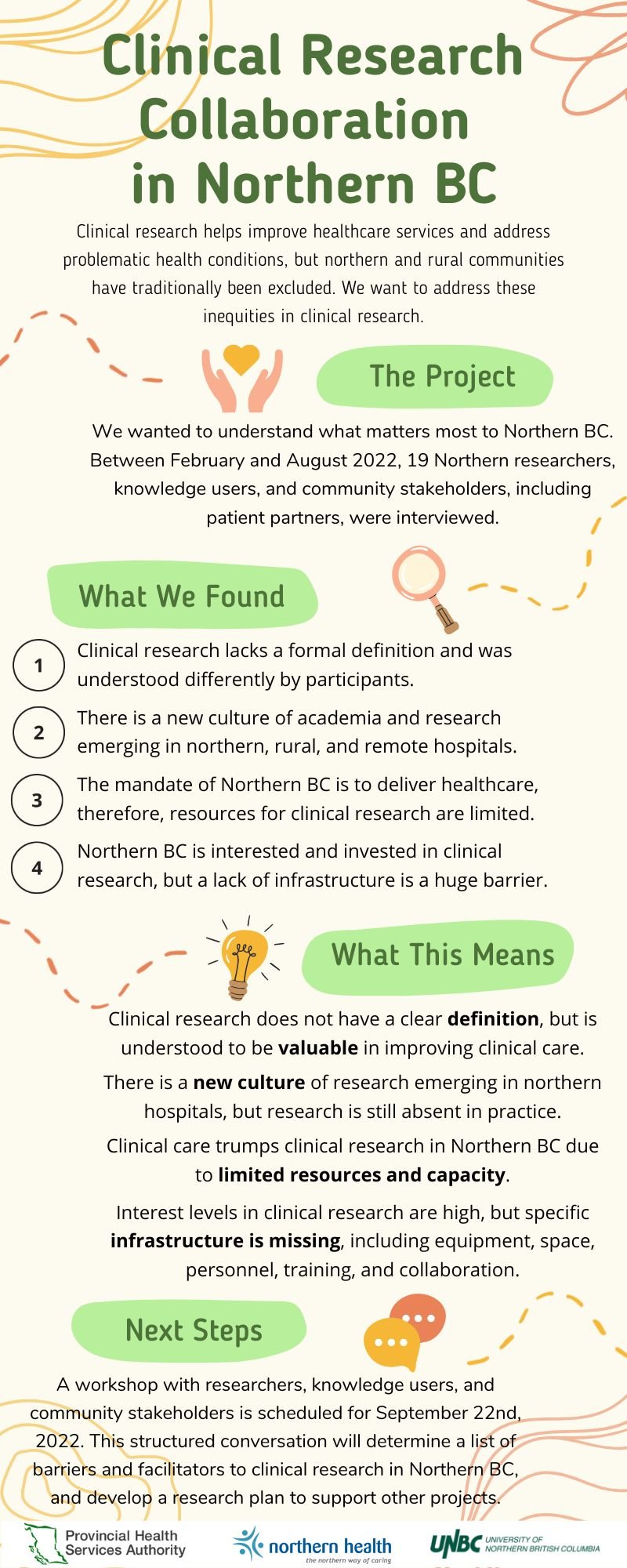Building Dialogues for Clinical Research Collaboration and Leadership in Northern British Columbia
Background
The health outcomes of those in rural and northern BC continue to lag behind the rest of the province, with burgeoning rates of chronic disease and more limited access to healthcare services contributing to poor health outcomes and lower life expectancy. Innovative clinical research, including clinical trials, provides a critical vehicle through which to advance the delivery of healthcare services and address problematic health conditions. However, those residing in rural communities have been traditionally excluded from clinical research. This has occurred in part due to a lack of clinical research capacity and infrastructure, along with challenges arising from the inclusion of geographically distanced and dispersed populations. In response, there are growing calls to address equity in the context of clinical research. Presently, there has been a growth in clinical research culture in northern BC, with an increasing amount of studies being designed and implemented on the subject. Furthermore, there can now be an exploration of increased clinical research capacity in northern BC, by examining facilitators and barriers to clinical research, and the effect collaboration can have towards supporting success.
Methods
Our team is utilizing a two-phase qualitative research design guided by Integrated Knowledge Translation (IKT) to examine barriers and facilitators to clinical research in northern BC. Our guiding research questions include: 1) What factors contribute to clinical research capacity and leadership in northern BC? 2) What are the barriers and facilitators of clinical research in northern BC? and 3) How can we learn from each other to sustain and cultivate continued clinical research growth in northern BC? The first phase of our research consisted of 17 interviews with researchers, knowledge users, and community stakeholders who were determined by theoretical saturation. Interviews were conducted and recorded over the Zoom platform between February and April 2022, then transcribed, and are currently undergoing analysis. The second phase of research is the priority setting meeting, currently scheduled for September 21st, 2022, which will be conducted and recorded over the Zoom platform. This meeting will consist of 12 researchers, knowledge users, and community stakeholders to determine research priorities for future projects related to clinical research in northern BC. Harmonized research ethics board approval was received prior to the collection of any data, and all participants granted written and verbal consent.
Preliminary Findings
A few key themes have emerged at this stage of our analysis: 1) the meaning of clinical research is a point of departure for participants, although they understand clinical research to be valuable to clinical care. However, the values of clinical research may be hidden. 2) The mandate of Northern BC is to deliver healthcare, not to conduct clinical research. 3) Some infrastructure currently exists in Northern BC to promote clinical research (primarily intangible). However, the need for more tangible and intangible infrastructure is significant to develop of a culture of clinical research in the North.
plain language summary
Clinical research helps improve healthcare services and address problematic health conditions, including complex and life-limiting illnesses, such as cancer. Northern and rural communities have traditionally been excluded from clinical research due to a lack of capacity and geographic challenges. We want to address these inequities and support the development of clinical research in Northern BC.
To better understand what matters most to those in Northern BC, 17 Northern researchers, knowledge users, and community stakeholders, including patient partners, were interviewed between February and April 2022. These interviews are still being analyzed, but important themes have been identified: 1) The definition of clinical research varies widely. Clinical research is understood to be valuable, but these values may be hidden. 2) Clinical care priorities trump clinical research in Northern BC. 3) Resources to support clinical research exist, but many more are needed.
A brief explanation of each theme:
There is no clear definition for clinical research, but most participants said it must be centered around people or patients. Clinical research is understood to support clinical care, but this value is not always realized. This impacts clinical research priorities and patient participation in clinical research.
Delivery of healthcare is perceived as the main priority for all clinicians. This impacts clinician involvement in research and whether the public values research.
While many participants expressed what already exists to support clinical research, all discussed the need for clinical research infrastructure, including training, equipment, collaboration, and human resources.
A workshop with 12 researchers, knowledge users, and community stakeholders is scheduled for September 21st, 2022. This structured conversation will determine a list of barriers and facilitators to clinical research in Northern BC, supporting a larger project.





